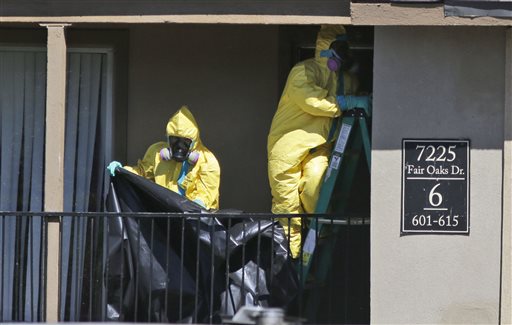DALLAS (AP) — After hospital officials on Saturday said the condition of the lone Ebola patient diagnosed in the U.S. has worsened, the woman he came to Texas to visit said she is praying for his recovery.
Louise Troh said that she was not aware until a reporter told her that Thomas Eric Duncan’s condition had been deemed critical and that she had not spoken with him Saturday.
“I pray in Jesus’ name that it will be all right,” Troh said in a telephone interview from the home where she and three others are being isolated.
Texas Health Presbyterian Hospital Dallas didn’t provide any further details or respond to questions about Duncan’s health on Saturday. The hospital has previously said Duncan, who was being kept in isolation, was in serious but stable condition.
Duncan traveled from disease-ravaged Liberia to Dallas last month before he began showing symptoms of the disease that has killed some 3,400 people in West Africa.
Health officials said Saturday that they are still monitoring about 50 people who may have had contact with Duncan for signs of the deadly disease. Among those are nine people who are believed to be at a higher risk. Thus far none have shown symptoms.
Included in the group being monitored are people who later rode in the ambulance that took Duncan to the hospital last Sunday, said Dr. Tom Frieden, the director of the Centers for Disease Control and Prevention.
Duncan was staying with Troh at a Dallas apartment when he became ill. On Friday a hazardous-materials crew hauled out items from the apartment in industrial barrels for permanent disposal. That same day, Troh, originally from Liberia, and three others — her 13-year-old son, Duncan’s distant relative and a family friend — were moved to a private residence where they are being carefully monitored.
The city had trouble finding a place to take them until a volunteer offered the private residence.
The first Ebola diagnosis in the U.S. has raised concerns about whether the disease could spread in the U.S. Federal health officials say they are confident they can control it.
Frieden said that they’ve already gotten “well over” 100 inquiries on suspicious cases in recent months, with an uptick coming after the Dallas patient was diagnosed. Federal officials have said tests have been done on about 15 and all but one — Duncan — were false alarms.
Most of the cases don’t involve travel to West Africa, “but we’d rather have a wider net cast,” said Frieden. That way “we’re more likely to find someone promptly if they did actually have exposure and they do actually have symptoms,” he said.
The virus that causes Ebola is not airborne and can only be spread through direct contact with the bodily fluids — blood, sweat, vomit, feces, urine, saliva or semen — of an infected person who is showing symptoms.
Duncan arrived in Dallas on Sept. 20 and fell ill a few days later. After an initial visit to the emergency room at Texas Health Presbyterian Hospital, he was sent home. He returned to the hospital two days later, last Sunday, and has been kept in isolation ever since.
The hospital’s explanation about what they knew about his travel history has changed in the time since his diagnosis was revealed on Tuesday. Federal health officials have advised hospitals to take a travel history for patients with any Ebola-like symptoms.
When Duncan’s diagnosis was first disclosed, the hospital said it wasn’t till he came back Sunday that they discovered he had been in West Africa. The hospital later acknowledged that Duncan had told a nurse his travel history on his first visit but said the information hadn’t been fully communicated to the whole team.
On Thursday, the hospital elaborated by saying that a flaw in the electronic health records systems led to separate physician and nursing workflows and that the doctor hadn’t had access to Duncan’s travel history.
But the hospital issued a statement late Friday saying that the doctor who initially treated Duncan did have access to his travel history after all.
Hospital spokesman Wendell Watson said Saturday he could provide no further details, saying, “We’re still looking into the entire chain of events.”

COMMENTS
Please let us know if you're having issues with commenting.